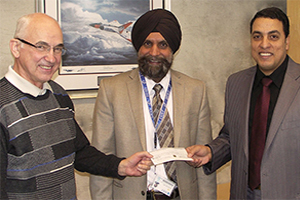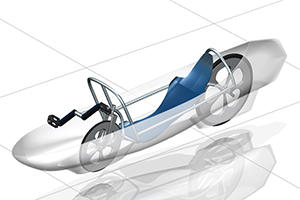UOIT Engineering students receive a boost in support of human-powered vehicle development
December 4, 2012

Mechanical Engineering students at the University of Ontario Institute of Technology (UOIT) working on plans to build a human-powered vehicle (HPV) are getting a boost – a jump start that comes in the form of a donation from an international professional engineering organization.
The Faculty of Engineering and Applied Science (FEAS) Capstone project involves four fourth-year Mechanical Engineering students and five students in different years of various other Engineering programs. The HPV is a bicycle at its core, with the sole source of power being the rider’s leg muscles through a familiar system of pedals, gears and chains. Their plan to develop the HPV has drawn the attention of the Society of Tribology and Lubrication Engineering (STLE). Dr. George Staniewski, senior technical expert, Engineering Support Division, Ontario Power Generation, and STLE member has presented the faculty with a $1,500 cheque in support of the students’ project.
“The STLE promotes advances in tribology –the science and technology of friction, wear and lubrication,” said Dr. Staniewski. “Our organization supports the increased performance of equipment and products, the conservation of resources and the protection of the environment, so our Toronto Section is proud to support the innovative HPV student project at UOIT, which aims to reduce carbon footprint and promote a healthy lifestyle.”
In addition the STLE Toronto Section will pay for STLE student and faculty co-ordinator memberships. Student member benefits include free attendance at the STLE Annual Meeting in May 2013 in Detroit, Michigan.
The student team has been acquiring off-the-shelf components and building a test rig to determine the ideal position for achieving maximum power, comfort and visibility. Computer simulations in a virtual wind tunnel have help the team optimize its design for efficiency, rider visibility and safety – even consideration of a special UV-reflective coating to keep the rider cool under the sun.

“Our HPV would be comparable to a Flintstones’ car if not for the high level of technical sophistication we have achieved through extensive computer-aided design: a velocity of 100 kilometres an hour using about 0.5 horsepower,” said Matt Gajkowski, second-year Mechanical Engineering student and technical director for the UOIT HPV team. “The tools offered to us by FEAS, including access to our faculty’s ultramodern labs, manufacturing equipment and the laptops and software included in our tuition – have all been indispensable resources for reaching and exceeding our design goals, which to create a fast and modern zero-emission vehicle.”
“I am offering the HPV Capstone design project after several students approached me in the summer and showed huge interest in building this vehicle and participating in the American Society of Mechanical Engineers HPV World Challenge,” said Dr. Atef Mohany, assistant professor, FEAS, and Capstone supervisor. “UOIT is just the second Canadian university team in this challenge and we’ll be working to perfect our HPV design over the next three years. We are grateful for the STLE’s support and are actively seeking further sponsors to cover the cost of the vehicle which is estimated at $8,000.”



